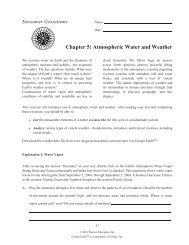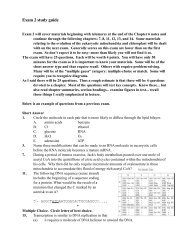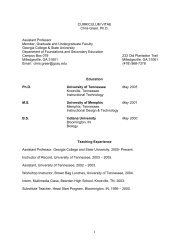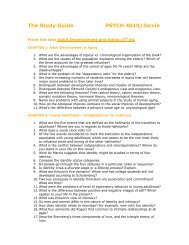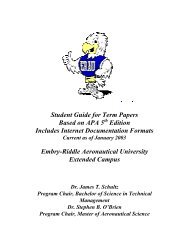THE GOVERNMENT OF GEORGIA
THE GOVERNMENT OF GEORGIA
THE GOVERNMENT OF GEORGIA
Create successful ePaper yourself
Turn your PDF publications into a flip-book with our unique Google optimized e-Paper software.
Supreme Court is the court of last resort for interpretation of the state constitution. TheSupreme Court is also the appellate court for cases involving divorce and alimony and landownership titles. The Supreme Court now has the authority to exercise some administrativesupervision over the state’s legal system. The high court can propose rules for lower courts,set standards of conduct for judges, set rules covering the removal or discipline of judges,and regulate the admission of attorneys to the State Bar (i.e., certify that an attorney canpractice in the state of Georgia).The primary trial courts in Georgia for criminal and civil cases are the Superiorcourts. The state is divided into 48 Superior court circuits, most of which cover severalcounties. Each circuit has at least one Superior court judge, and most have several (theAtlanta circuit has eighteen). The judges of a circuit will "travel the circuit," i.e., will holdcourt in each county of the circuit a specified number of days each month. The Superiorcourts have exclusive trial jurisdiction in cases involving felonies, divorces, and ownership ofland, and they also serve as appellate courts for most of the lower courts. Currently, superiorcourt judges are elected to four-year terms in non-partisan campaigns in their circuits.However, this system has been challenged in federal court as being racially discriminatory.The claim is that having all judges of the same circuit elected by the whole circuit givesdisproportionate power to the racial majority; minorities will be out-voted in election afterelection. Some experts have called for changing to the "Missouri Plan," in which thegovernor would appoint the Superior court judge, and voters at the next election would thenchoose to retain or reject the judge with no opponents listed on the ballot. If rejected, thegovernor would appoint another judge who would go through the same process. Advocates ofthe Missouri Plan argue that governors are better evaluators of judicial qualifications than thegeneral public and would be more likely to appoint a racially balanced judiciary.Also elected in the Superior court circuit is a District Attorney(DA), who serves as thestate's representative (the prosecution) in criminal cases. The DA presents evidence ofcriminal conduct to a Grand Jury ("grand" means large, having 16 to 24 persons) which mayissue indictments, or formal accusations. The DA will serve as prosecuting attorney in theSuperior court trial--if in a fact a trial is held. Most criminal cases (over 93%) conclude inplea bargaining, before the trial is held, with the defendant pleading guilty to a crime oflesser magnitude, and lower penalty, than that with which he was first accused. Rather thanarguing cases before a trial judge and a petit jury ("petit" means small, or 12 persons), themajor job of the DA is actually to negotiate bargained pleas.By far most courts in Georgia are those of limited trial jurisdiction, responsible onlyfor narrow types of cases. In about half of Georgia's counties, State courts have beenestablished to handle misdemeanor criminal cases and most civil cases. State court judgesmust be attorneys and are chosen in non-partisan elections for four-year terms. In somecounties, separate Juvenile courts have been established to decide cases involving suspectswho are less than 17 years old. The judges of the separate Juvenile courts are usuallyappointed by the Superior court judge in their county. They must be attorneys, and they servefour-year terms. In other counties, the Superior court judge also serves as theJuvenile court judge.Every county in Georgia must have a Probate court, which is given a grab-bag offunctions. The duties of Probate court judges include handling wills and estates of deceasedpersons, disposing of some traffic violations, issuing marriage licenses, supervising elections,and committing people to mental hospitals. Probate judges are elected to four-year terms and,except in counties with populations over 100,000, are not required to be lawyers.One of the major changes brought about by the 1982 constitution was theconsolidation of hundreds of small local courts, especially the old justices of the peace and17



